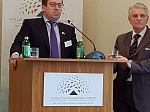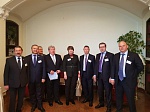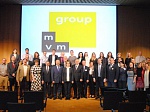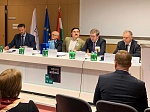20.05.2019
COMMUNICATIONS DEPARTMENT OF ROSENERGOATOM
The international environmental expedition took place at the Paksh NPP in Hungary
The safety of the power blocks designed in Russia and the cooperation between the Hungarian government and the Rosatom State Corporation in the realm of joint social and cultural projects were the main topics of the first international Russian-Hungarian environmental expedition to the Paksh NPP in Hungary on May 15-17.
The members of the Council of Federation and the National Duma of the Russian Federation, the representatives of the Rosatom State Corporation and the Rosenergoatom Joint-Stock Company Public Council, the ‘Green Cross’ transregional environmental public organization and the ‘Oka’ environmental group. During their trip to Hungary, the members of the Russian delegation met with Vladimir Sergeev, Ambassador Extraordinary and Plenipotentiary of the Russian Federation in Hungary, Yanosh Latortsai, the Vice-Speaker of the Hungarian Parliament, Yanosh Shuli, the minister responsible for the design, construction, and operational launch of the two new Paksh NPP power blocks, Pal Kovach, the state secretary of energy, and the top management of the MVM Group (an energy supply company in Hungary) and the Paksh NPP.
The representatives of the transregional environmental group ‘Oka’ and other Hungarian environment protection organization performed some radiation monitoring and meteorological measurements at the current and under-construction power blocks of the Paksh NPP as well as held a public poll among the population to discuss if they found it appropriate to develop the nuclear power projects. The summary of the environmental expedition were presented during the media conference in the city of Paksh.
‘The international format of holding public environment protection verifications at nuclear powers is an effective tool that facilitates impartial evaluation of the environmental safety of nuclear power plants designed in Russia. It is also important to mention the importance of the Paksh NPP-2 power blocks’ construction projects and the way they contribute to the welfare of the population living next to the power plant, as well as a number of social and economic project coming along the way’, Alexey Mayorov, the Committee Chairman of the Russian Council of Federation responsible for agricultural and food policy and natural resources management, said.
‘The idea of this form of cooperation between Russia and Hungary in the realm of nuclear power production safety was supported greatly by the government of Hungary. This is a good example showing the principles of transparency and equality adhered to by the global nuclear power companies when it comes to public relations’, Pal Kovach, the state secretary of energy in Hungary, noted.
‘Each country building its own NPP makes a great contribution into preventing greenhouse effect. Every year, all running NPPs of the world prevent over 2 million tons of CO2 emissions into the atmosphere. Nuclear power has low potential for acidification and eutrophication and emits almost no air pollutants that might harm an ecosystem’, Alexey Ekidin, a lead scientist at the Institute for industrial ecology, and expert of the Rosatom State Corporation Public Council, stated.
‘During the international expedition, we once again ensured that the current and the constructed power blocks in Hungary are fully safe. Besides, we have agreed on the future implementation of the common Russian-Hungarian projects in the social and cultural aspects’, Svetlana Churilova, the head of regional development and governmental authorities relations department at the Rosenergoatom Joint-Stock Company, said. She also mentioned that it wasn’t the first environmental expedition involving the Company. Previously, in 2016, a similar event to evaluate the safety of the Leningrad NPP-2 construction project was held, and experts from 6 countries participated in it. The benchmark measures were also taken at the Belarusian NPP construction site. There is also a track record in conducting public hearings involving international experts at different sites in the Russian Federation.
Rosenergoatom JSC is the leading enterprise of the Electric Energy Division of Rosatom State Corporation, the leader in electric energy generation both in Russia and abroad. It is the largest generating company in Russia and the 2nd largest in the world in terms of the volume of nuclear generating capacity. The Concern includes all 10 Russian nuclear power plants, which grant the status of branches, as well as enterprises that support the activities of the generating company. In total, 35 power units with a total installed capacity of 27.9 GW are operated at 10 Russian nuclear power plants. At present, the nuclear power plants of Russia produce about 19% of the total electric energy in the country.
Eutrophication is a process of pollution that occurs when a lake or stream becomes over-rich in plant nutrients; as a consequence, it becomes overgrown in organic productivity. Eutrophication may be a result of either natural aging of water pond or human-induced impact.





 career
career Innovations
Innovations Projects
Projects INTERNATIONAL BUSINESS
INTERNATIONAL BUSINESS